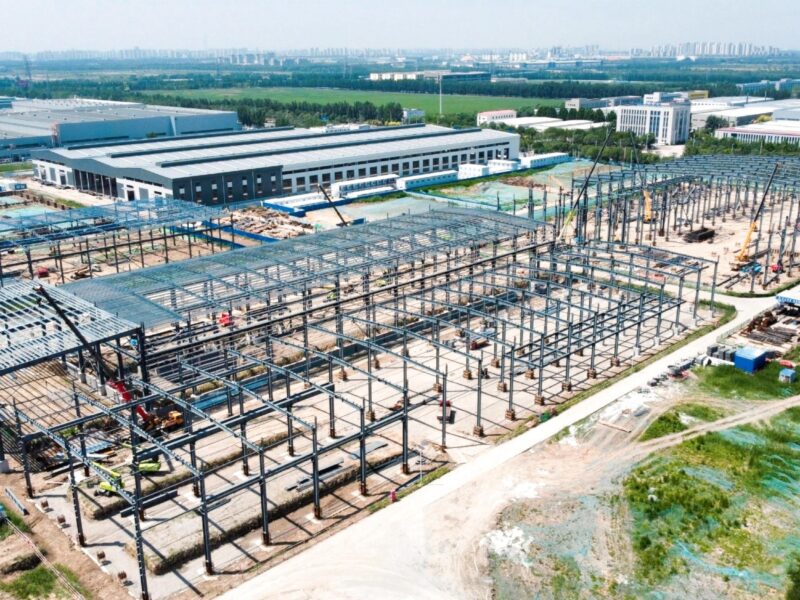
The Ultimate Guide to Choosing a Reliable Steel Structure ManufacturerIntroduction
In today’s fast-growing construction and industrial sectors, steel structures have become the backbone of modern engineering. From large warehouses and factories to airports and commercial complexes, steel offers flexibility, durability, and cost efficiency. However, the success of any steel structure project heavily depends on one crucial factor — choosing the right steel structure manufacturer.
A reliable manufacturer doesn’t just supply materials; they ensure precision in fabrication, compliance with international standards, and on-time delivery. In this guide, we’ll explore how to evaluate and select a trustworthy steel structure manufacturer, what to look for in terms of quality and capability, and how your decision can impact the success of your project.
What Does a Steel Structure Manufacturer Do?
A steel structure manufacturer is responsible for designing, fabricating, and supplying steel components used in various buildings and infrastructure projects. These manufacturers typically handle the entire production process, including:
- Design & Engineering: Creating structural drawings and 3D models (often using BIM) to ensure safety and efficiency.
- Fabrication: Cutting, welding, and assembling steel parts according to design specifications.
- Surface Treatment: Applying galvanization, painting, or anti-corrosion coatings.
- Quality Testing: Conducting non-destructive testing, load testing, and dimensional checks.
- Logistics & Installation Support: Packing, shipping, and sometimes offering on-site guidance.
Depending on the project type, manufacturers may specialize in light steel, heavy steel, or prefabricated structures — each with different production capabilities and technical expertise.
Key Factors When Choosing a Steel Structure Manufacturer
Selecting the right partner requires more than comparing prices. You need to assess several critical aspects:
1. Manufacturing Capacity
A strong manufacturer should have advanced production lines, CNC equipment, and sufficient plant area. Large-scale factories can handle complex and high-volume orders more efficiently, ensuring both precision and delivery speed.
2. Engineering Capability
Look for a manufacturer with an in-house engineering team capable of customizing designs based on your requirements. The use of BIM (Building Information Modeling) and 3D simulations can significantly reduce design errors and optimize material use.
3. Quality Control
Quality is non-negotiable in steel fabrication. Verify that the manufacturer complies with standards such as ISO 9001, CE, EN 1090, or AWS certifications. Ask about their internal inspection procedures — from raw material sourcing to final assembly — and ensure they conduct ultrasonic or radiographic weld testing.
4. Materials and Standards
Not all steel is the same. The best manufacturers use high-grade steel (like Q345B, ASTM A36, or S355) and apply proper surface coatings to resist corrosion and extend lifespan, especially for coastal or industrial environments.
5. Delivery and Logistics
Time is money in construction. Check whether the supplier has export experience, a professional logistics network, and can guarantee timely delivery — particularly for international projects.
6. After-Sales Support
Reliable partners provide ongoing support, including installation guidance, technical documentation, and maintenance advice. Good communication after delivery reflects the company’s commitment to long-term cooperation.
Common Applications of Steel Structures
Steel structures are widely used in various industries due to their versatility and cost-effectiveness. Typical applications include:
- Industrial buildings: Factories, workshops, and power plants.
- Warehouses & logistics centers: Large-span storage solutions with fast construction speed.
- Public facilities: Airports, stadiums, exhibition halls, and train stations.
- Commercial buildings: Office towers, shopping malls, and car parks.
- Infrastructure projects: Bridges, hangars, and energy stations.
Each application requires unique structural considerations — for example, high-load capacity for factories or corrosion resistance for coastal projects.
A professional steel structure manufacturer can tailor design and materials accordingly, ensuring optimal performance and safety.
How to Evaluate a Manufacturer Before You Buy
Before committing to a supplier, it’s crucial to conduct a thorough evaluation. Here’s a step-by-step process:
- Research Online Reputation: Check company websites, LinkedIn, and industry directories. Look for certifications, project photos, and client testimonials.
- Request Technical Documents: Ask for fabrication drawings, material test reports, and quality inspection records.
- Factory Audit: If possible, visit the factory or request a virtual tour to inspect machinery, welding workshops, and storage facilities.
- Third-Party Inspection: Engage independent testing agencies (like SGS or BV) for pre-shipment inspections.
- Customer References: Contact previous clients to assess reliability and communication quality.
This diligence helps ensure that your investment is secure and your project proceeds smoothly.
Cost Considerations in Steel Structure Manufacturing
While cost is always a deciding factor, the lowest price doesn’t always mean the best value. Here’s what typically affects the total cost:
- Material cost: Type and grade of steel.
- Fabrication complexity: Custom designs, cutting precision, and welding volume.
- Surface treatment: Galvanizing or paint systems.
- Labor and machinery: Automation level and workforce skill.
- Transportation: Shipping distance, container loading, and customs.
The key is finding a balance between cost and quality. A transparent quotation that breaks down each component helps you compare fairly between suppliers.
Why Choose Guihe Group as Your Steel Structure Partner
At Guihe Group, we specialize in providing custom steel structure solutions for industrial, commercial, and infrastructure projects worldwide.
Here’s why hundreds of clients choose us as their trusted manufacturer:
- Strong Production Capacity: Over XX,000 m² of factory area and advanced CNC and welding equipment.
- Experienced Engineering Team: Decades of design and technical expertise in international standards (EN, ASTM, GB).
- Strict Quality Control: ISO 9001 certified, with full inspection reports for every project.
- Global Project Experience: Successfully delivered projects in over XX countries.
- Comprehensive Service: From design and fabrication to installation guidance and after-sales support.
We believe in building long-term partnerships based on quality, reliability, and trust.
Conclusion
Choosing the right steel structure manufacturer can make or break your construction project.
A qualified supplier ensures structural safety, project efficiency, and long-term durability — while reducing risks and unexpected costs.
By evaluating a manufacturer’s capacity, quality standards, certifications, and reputation, you’ll be well-equipped to make an informed decision and achieve success in your steel structure project.
